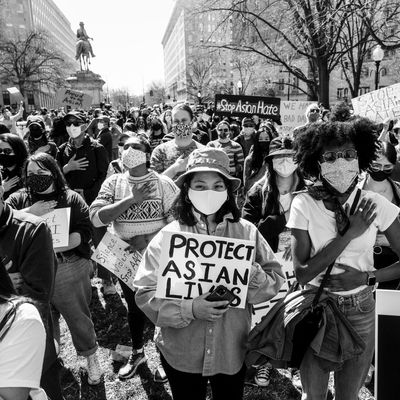
On this day last year, Daoyou Feng, Hyun Jung Grant, Suncha Kim, Soon Chung Park, Xiaojie Tan, and Yong Ae Yue were murdered by a terrorist who police said was “having a bad day.” Since then, Asian Americans have known many more bad days. Bad days on which a 67-year-old Filipina woman was punched more than 100 times and spit on. Bad days on which seven women were assaulted by the same man in a span of two hours. Bad days on which our elders were slashed or bludgeoned with rocks and hammers, like GuiYing Ma and Noel Quintana. Bad days on which a man my father’s age had his head stomped on while he was collecting cans, like Yao Pan Ma. Bad days on which women — who very well could have been me — were pushed in front of a train, like Michelle Go, or followed home and stabbed to death, like Christina Yuna Lee.
How much more can we take? In the year since the Atlanta spa shootings, many versions of this story have been written. They start with surnames that still register as foreign to most readers skimming over them and end with an appeal to the community to please, please stand up and keep fighting. But with what? Yet another memorial fund?
Right now, many Americans of Asian descent feel like we’ve been pushed to our emotional limits, even if the generational trauma coded into our DNA gives us an extraordinary capacity to endure suffering. People who fail to grasp that “there is no hierarchy of oppression” invalidate our experiences by calling them lesser, or even nonexistent, and head to the comments section to dismiss essays like this as the rantings of an “angry minority.” As comedian Youngmi Mayer writes, “One of the most jarring experiences is when something bad happens to Asians and I go to an all-white space, and someone asks me how I feel and I say ‘sad’ and they say, ‘Oh no! Why?’”
These responses teach us to police our own emotions — or even “blame themselves or believe some of the negative messages from discrimination,” says Kevin Nadal, a distinguished professor at the City University of New York and a Filipino American. But silence does not benefit us. In fact, it’s partially how we came to earn the damning reputation of a model minority, tracing back to when Chinese immigrants worked on the transcontinental railroad in the 1800s for less pay and under more dangerous conditions than their Irish counterparts — and were still called “the dregs of Asia” for it. It took a historic eight-day strike during which food, supplies, and transportation were choked off to thousands of Chinese laborers for their employers to realize that the Chinese weren’t docile and wouldn’t be taken for granted. But today, the persistence of our image as obedient hard workers — and the fact that we have it “pretty good” in this country because of that categorization — means we’re still hesitant to publicly express our anger, frustration, and helplessness, even in the face of this prolonged explosion in anti-Asian hate crimes. As if “good behavior” will ever change our status as permanent guests here, even if many of us know no other place to “go back” to.
These attacks and the feeble reactions to them make me think about how my parents had to prove, over and over, that they deserved a place in the United States. How they had to go through a humiliating green-card application process in which they had to post their own jobs in the classifieds and watch as competing résumés flooded in. How they had to endure years of Midwest-nice microaggressions before holding their hands up in an unimpressive courtroom to take an oath that now reads like a pretty rotten deal. How their grade-school-age children watched proudly, even though the realization that we’d never be considered fully American had already begun to dawn on us from our peers’ snickers and back-of-the-bus slant-eye gestures.
Our upbringing tells us to “eat bitter” — to not be a burden — but it’s time to unlearn this and demand that our grief be heard. Our community will keep saying the names of our dead while gathering the scattered flowers and taping up the torn posters honoring their memories. We will keep voting out and occupying the offices of politicians who spew racist rhetoric. We will keep publicly challenging media that propagates the same harmful stereotypes while erasing Asian Americans (ABC World News Tonight, for example, recently misidentified community activist Grace Lee as Michelle Go, suggesting that even after death we are seen as interchangeable). We will keep compassionately educating those around us — including, sadly, other people of color — who accept and act on the lie that we’re to blame for COVID without realizing that this self-sabotage upholds white supremacy. We will hold space for ourselves, go to therapy, and fight our instincts to isolate.
But I’ve given up on asking the mostly well-meaning, yet oblivious, white folks around me to center the experiences of Asian women. When I do, it’s usually met with an empty “I’m sorry you’re going through this.” So I will center myself. I will no longer change the subject so that no one feels awkward — I’ll speak this full, unsugarcoated truth. If we can’t elicit real understanding from those who put how-to-help links in their bios and call it allyship, we might as well go for discomfort.

